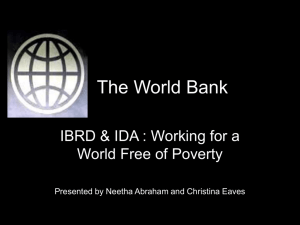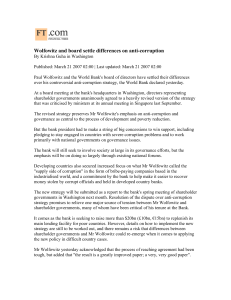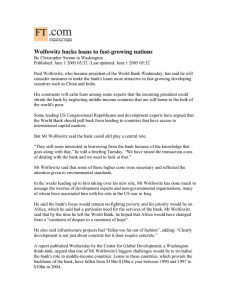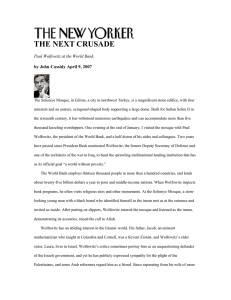Document 12526996
advertisement
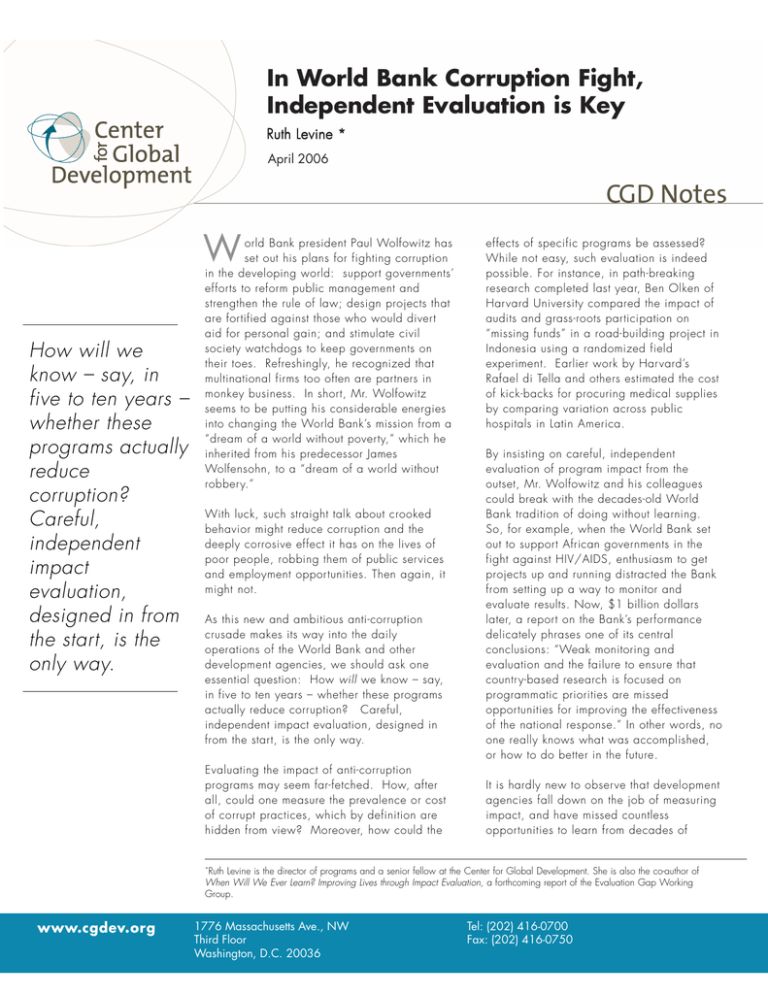
In World Bank Corruption Fight, Independent Evaluation is Key Ruth Levine * April 2006 W How will we know – say, in five to ten years – whether these programs actually reduce corruption? Careful, independent impact evaluation, designed in from the start, is the only way. orld Bank president Paul Wolfowitz has set out his plans for fighting corruption in the developing world: support governments’ efforts to reform public management and strengthen the rule of law; design projects that are fortified against those who would divert aid for personal gain; and stimulate civil society watchdogs to keep governments on their toes. Refreshingly, he recognized that multinational firms too often are partners in monkey business. In short, Mr. Wolfowitz seems to be putting his considerable energies into changing the World Bank’s mission from a “dream of a world without poverty,” which he inherited from his predecessor James Wolfensohn, to a “dream of a world without robbery.” With luck, such straight talk about crooked behavior might reduce corruption and the deeply corrosive effect it has on the lives of poor people, robbing them of public services and employment opportunities. Then again, it might not. As this new and ambitious anti-corruption crusade makes its way into the daily operations of the World Bank and other development agencies, we should ask one essential question: How will we know – say, in five to ten years – whether these programs actually reduce corruption? Careful, independent impact evaluation, designed in from the start, is the only way. Evaluating the impact of anti-corruption programs may seem far-fetched. How, after all, could one measure the prevalence or cost of corrupt practices, which by definition are hidden from view? Moreover, how could the effects of specific programs be assessed? While not easy, such evaluation is indeed possible. For instance, in path-breaking research completed last year, Ben Olken of Harvard University compared the impact of audits and grass-roots participation on “missing funds” in a road-building project in Indonesia using a randomized field experiment. Earlier work by Har vard’s Rafael di Tella and others estimated the cost of kick-backs for procuring medical supplies by comparing variation across public hospitals in Latin America. By insisting on careful, independent evaluation of program impact from the outset, Mr. Wolfowitz and his colleagues could break with the decades-old World Bank tradition of doing without learning. So, for example, when the World Bank set out to support African governments in the fight against HIV/AIDS, enthusiasm to get projects up and running distracted the Bank from setting up a way to monitor and evaluate results. Now, $1 billion dollars later, a report on the Bank’s performance delicately phrases one of its central conclusions: “Weak monitoring and evaluation and the failure to ensure that country-based research is focused on programmatic priorities are missed opportunities for improving the effectiveness of the national response.” In other words, no one really knows what was accomplished, or how to do better in the future. It is hardly new to observe that development agencies fall down on the job of measuring impact, and have missed countless opportunities to learn from decades of Ruth Levine is the director of programs and a senior fellow at the Center for Global Development. She is also the co-author of When Will We Ever Learn? Improving Lives through Impact Evaluation, a forthcoming report of the Evaluation Gap Working Group. * www.cgdev.org 1776 Massachusetts Ave., NW Third Floor Washington, D.C. 20036 Tel: (202) 416-0700 Fax: (202) 416-0750 The U.S. and other countries that own the World Bank have a rare opportunity to fix this problem. As corruption-fighting programs are put into place, donor and recipient countries can request and fund careful, credible and independent third-party evaluation of Bank and other agencies’ programs. www.cgdev.org successes and failures. Routinely, across a wide range of programs, little effort is given to collecting baseline data and carefully, independently evaluating the onthe-ground impact of public money. In fact, weak evaluation is such a well-documented problem that we have to wonder why it persists. Surely it should be easier for the Bank and other agencies to improve their own evaluation activities – and thereby make better use of Bank resources – than to undertake the truly massive social transformations, such as wiping out the culture of corruption. The U.S. and other countries that own the World Bank have a rare opportunity to fix this problem. As corruption-fighting programs are put into place, donor and recipient countries can request and fund careful, credible and independent thirdparty evaluation of Bank and other agencies’ programs. Collect information about starting conditions, roll out programs so that sensible comparisons can be made, conduct rigorous evaluations and, when the results are in, publish them regardless of whether or not they make the funders and implementers look good. If Mr. Wolfowitz and his friends really want honesty and transparency, they could start by closing the evaluation gap. 1776 Massachusetts Ave., NW Third Floor Washington, D.C. 20036 About the Evaluation Gap W orking Group Working and the Global Health Policy Research Network The Evaluation Gap Working Group was convened by the Global Health Policy Research Network as an initiative of the Center for Global Development. Its goal is to address the problem of the lack of knowledge about the effectiveness of social programs in low and middlie-income countries. The Global Health Policy Research Network (GHPRN) brings together leading experts in public health, economics and other social science and technical fields to develop original, focused research on high-priority global health policy issues. The GHPRN seeks opportunities to contribute analyses about better ways to stimulate and support innovation in products, effective public health practices and delivery strategies, to ensure equitable access over the long-term to key health services, and to better understand how investments in the health sector affects both health conditions and broader economic and social development. For more information about the GHPRN, please visit www.cgdev.org/globalhealth Tel: (202) 416-0700 Fax: (202) 416-0750

